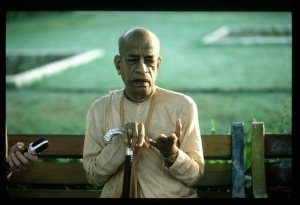CC Madhya 17.183: Difference between revisions
m (1 revision(s)) |
(Vanibot #0054 edit - transform synonyms into clickable links, which search similar occurrences) |
||
| (One intermediate revision by one other user not shown) | |||
| Line 1: | Line 1: | ||
{{ | [[Category:Sri Caitanya-caritamrta - Madhya-lila Chapter 17|C183]] | ||
<div style="float:left">'''[[Sri Caitanya-caritamrta|Śrī Caitanya-caritāmṛta]] - [[CC Madhya|Madhya-līlā]] - [[CC Madhya 17|Chapter 17: The Lord Travels to Vṛndāvana]]'''</div> | |||
<div style="float:right">[[File:Go-previous.png|link=CC Madhya 17.182|Madhya-līlā 17.182]] '''[[CC Madhya 17.182|Madhya-līlā 17.182]] - [[CC Madhya 17.184|Madhya-līlā 17.184]]''' [[File:Go-next.png|link=CC Madhya 17.184|Madhya-līlā 17.184]]</div> | |||
{{CompareVersions|CC|Madhya 17.183|CC 1975|CC 1996}} | |||
{{RandomImage}} | |||
==== TEXT 183 ==== | ==== TEXT 183 ==== | ||
<div | <div class="verse"> | ||
‘mūrkha’-loka karibeka tomāra nindana | :‘mūrkha’-loka karibeka tomāra nindana | ||
sahite nā pārimu sei ‘duṣṭe’ra vacana | :sahite nā pārimu sei ‘duṣṭe’ra vacana | ||
</div> | </div> | ||
| Line 12: | Line 16: | ||
==== SYNONYMS ==== | ==== SYNONYMS ==== | ||
<div | <div class="synonyms"> | ||
mūrkha- | ''[//vanipedia.org/wiki/Special:VaniSearch?s=mūrkha&tab=syno_o&ds=1 mūrkha]-[//vanipedia.org/wiki/Special:VaniSearch?s=loka&tab=syno_o&ds=1 loka]'' — foolish persons; ''[//vanipedia.org/wiki/Special:VaniSearch?s=karibeka&tab=syno_o&ds=1 karibeka]'' — will do; ''[//vanipedia.org/wiki/Special:VaniSearch?s=tomāra&tab=syno_o&ds=1 tomāra] [//vanipedia.org/wiki/Special:VaniSearch?s=nindana&tab=syno_o&ds=1 nindana]'' — blaspheming You; ''[//vanipedia.org/wiki/Special:VaniSearch?s=sahite&tab=syno_o&ds=1 sahite] [//vanipedia.org/wiki/Special:VaniSearch?s=nā&tab=syno_o&ds=1 nā] [//vanipedia.org/wiki/Special:VaniSearch?s=pārimu&tab=syno_o&ds=1 pārimu]'' — I shall not be able to tolerate; ''[//vanipedia.org/wiki/Special:VaniSearch?s=sei&tab=syno_o&ds=1 sei]'' — those; ''[//vanipedia.org/wiki/Special:VaniSearch?s=duṣṭera&tab=syno_o&ds=1 duṣṭera] [//vanipedia.org/wiki/Special:VaniSearch?s=vacana&tab=syno_o&ds=1 vacana]'' — words of mischievous persons. | ||
</div> | </div> | ||
| Line 19: | Line 23: | ||
==== TRANSLATION ==== | ==== TRANSLATION ==== | ||
<div | <div class="translation"> | ||
"Foolish people will blaspheme You, but I shall not tolerate the words of such mischievous people." | |||
</div> | </div> | ||
| Line 26: | Line 30: | ||
==== PURPORT ==== | ==== PURPORT ==== | ||
<div | <div class="purport"> | ||
Śrīla Bhaktisiddhānta Sarasvatī Ṭhākura remarks that although the brāhmaṇa did not belong to a superior community, he fearlessly chastised so-called caste brāhmaṇas because he was situated on the platform of pure devotional service. There are people who are opposed to Śrī Caitanya Mahāprabhu’s accepting a Vaiṣṇava belonging to a lower caste. Such people do not consider mahā-prasādam transcendental, and therefore they are described here as mūrkha (foolish) and duṣṭa (mischievous). A pure devotee has the power to challenge such high-caste people, and his brave statements are not to be considered proud or puffed up. On the contrary, he is to be considered straightforward. Such a person does not like to flatter high-class brāhmaṇas who belong to the non-Vaiṣṇava community. | Śrīla Bhaktisiddhānta Sarasvatī Ṭhākura remarks that although the ''brāhmaṇa'' did not belong to a superior community, he fearlessly chastised so-called caste ''brāhmaṇas'' because he was situated on the platform of pure devotional service. There are people who are opposed to Śrī Caitanya Mahāprabhu’s accepting a Vaiṣṇava belonging to a lower caste. Such people do not consider ''mahā-prasādam'' transcendental, and therefore they are described here as ''mūrkha'' (foolish) and ''duṣṭa'' (mischievous). A pure devotee has the power to challenge such high-caste people, and his brave statements are not to be considered proud or puffed up. On the contrary, he is to be considered straightforward. Such a person does not like to flatter high-class ''brāhmaṇas'' ''mahā-prasādam'' who belong to the non-Vaiṣṇava community. | ||
</div> | </div> | ||
__NOTOC__ | |||
<div style="float:right; clear:both;">[[File:Go-previous.png|link=CC Madhya 17.182|Madhya-līlā 17.182]] '''[[CC Madhya 17.182|Madhya-līlā 17.182]] - [[CC Madhya 17.184|Madhya-līlā 17.184]]''' [[File:Go-next.png|link=CC Madhya 17.184|Madhya-līlā 17.184]]</div> | |||
__NOTOC__ | |||
__NOEDITSECTION__ | |||
Latest revision as of 22:13, 19 February 2024

A.C. Bhaktivedanta Swami Prabhupada
TEXT 183
- ‘mūrkha’-loka karibeka tomāra nindana
- sahite nā pārimu sei ‘duṣṭe’ra vacana
SYNONYMS
mūrkha-loka — foolish persons; karibeka — will do; tomāra nindana — blaspheming You; sahite nā pārimu — I shall not be able to tolerate; sei — those; duṣṭera vacana — words of mischievous persons.
TRANSLATION
"Foolish people will blaspheme You, but I shall not tolerate the words of such mischievous people."
PURPORT
Śrīla Bhaktisiddhānta Sarasvatī Ṭhākura remarks that although the brāhmaṇa did not belong to a superior community, he fearlessly chastised so-called caste brāhmaṇas because he was situated on the platform of pure devotional service. There are people who are opposed to Śrī Caitanya Mahāprabhu’s accepting a Vaiṣṇava belonging to a lower caste. Such people do not consider mahā-prasādam transcendental, and therefore they are described here as mūrkha (foolish) and duṣṭa (mischievous). A pure devotee has the power to challenge such high-caste people, and his brave statements are not to be considered proud or puffed up. On the contrary, he is to be considered straightforward. Such a person does not like to flatter high-class brāhmaṇas mahā-prasādam who belong to the non-Vaiṣṇava community.